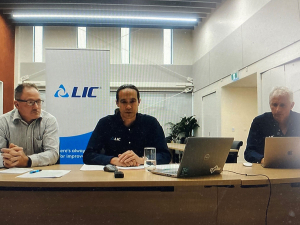LIC lifts half-year revenue on strong demand for dairy genetics
Herd improvement company LIC has posted a 5.2% lift in half-year revenue, thanks to increasing demand for genetics.
 LIC chief executive David Chin (centre) and senior managers Malcolm Ellis (left) and Richard Spellman front up to farmers.
LIC chief executive David Chin (centre) and senior managers Malcolm Ellis (left) and Richard Spellman front up to farmers.
Herd Improvement company LIC is paying out over $2 million this week, as compensation for supplying some dairy farmers bad sire semen.
LIC chief executive David Chin apologised to farmers during a webinar this evening, adding that the farmer-owned co-operative had not lived up to the high standards expected by shareholders.
Chin says an independent internal investigation is underway to ascertain how two batches of bad semen were delivered to 1127 farms around the country - semen collected, processed and packed into straws and then sent to farms on October 15th and October 21st failed to pass quality control tests on day three. The straws were used over three days to mate herds and resulted in lower pregnancy rates. 15 of the 39 straws collected on October 16th and five of 31 straws collected on October 21st were affected.
Chin says LIC is still no closer to finding out how the batches were impacted.
“We are having a thorough investigation and looking at the processes,” he told farmers.
The report will be presented to LIC board and its shareholder reference group.
Chin says the report will help the co-op to improve its operations.
LIC board chair Corrigan Sowman told farmers that the board takes the incident very seriously.
“On behalf of the board, we are disappointed that we have let you down as farmers,” says Sowman, who took over as LIC chair last month.
Chin, Sowman and LIC general manager NZ markets Malcolm Ellis fielded questions from farmers. Some questioned why it took LIC until October 26th to contact affected farmers and until November 14th to contact all shareholders.
Chin responded that it contacted affected farmers on October 26th to inform them “that we had a concern about the day three straws”. The 18-24 day returns of day three straws came back to LIC on November 12th. The next day LIC decided to refund farmers and a letter went out to all shareholders a day later.
LIC is offering affected farmers a compensation package that has two categories and payments will be made on Thursday.
LIC says all affected inseminations across all 6 days will be credited to the value of the original product used.
In addition:
The 5+ A Day Charitable Trust has launched a collection of affordable recipes designed to turn everyday vegetables into seasonal stars.
Jane Mellsopp has been confirmed as the new Government Appointee to the New Zealand Meat Board (NZMB).
To celebrate the tenth anniversary of its annual Good Deeds competition, Rabobank will give away $100,000 to improve rural community hubs, schools, clubrooms, and marae across New Zealand.
Agricultural and veterinary product supplier Shoof International has appointed Michaela Dumper as its new chief executive.
Federated Farmers is celebrating following the Government's announcement that young farmers will be able to use their KiwiSaver funds to buy their first home or farm.
The Meat Industry Association of New Zealand (MIA) today announced that Chief Executive Officer Sirma Karapeeva has resigned from the role.

OPINION: A mate of yours truly reckons rural Manawatu families are the latest to suffer under what he calls the…
OPINION: If old Winston Peters thinks building trade relations with new nations, such as India, isn't a necessary investment in…